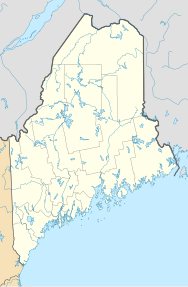Avon, Maine
| Avon, Maine | |
|---|---|
| Town | |
| Location within the state of Maine | |
| Coordinates: 44°47′22″N 70°19′25″W / 44.78944°N 70.32361°W | |
| Country | United States |
| State | Maine |
| County | Franklin |
| Incorporated | 1802 |
| Area | |
| • Total | 41.65 sq mi (107.87 km2) |
| • Land | 41.39 sq mi (107.20 km2) |
| • Water | 0.26 sq mi (0.67 km2) |
| Elevation | 1,020 ft (311 m) |
| Population (2010) | |
| • Total | 461 |
| • Estimate (2012) | 460 |
| • Density | 11.1/sq mi (4.3/km2) |
| Time zone | Eastern (EST) (UTC-5) |
| • Summer (DST) | EDT (UTC-4) |
| ZIP code | 04966 |
| Area code(s) | 207 |
| FIPS code | 23-02235 |
| GNIS feature ID | 0582336 |
Avon is a town in Franklin County, Maine, United States. The population was 461 at the 2010 census. Avon is home to Mount Blue, part of Mount Blue State Park.
First known as Township 2 Abbott's Purchase, or Upper Town, it was settled in 1781 by a pair of sea captains—Joshua Soule, originally from Duxbury, Massachusetts and later Bremen, Maine, with Perkins Allen from Martha's Vineyard. The town was incorporated on February 22, 1802, named for the River Avon in England. One of the Worcestershire villages through which River Avon flows is Eckington, birthplace of Capt. Soule's ancestor, George Soule, a Mayflower Pilgrim. Capt. Soule's son, Bishop Joshua Soule, was raised in Avon.
Fertile soil on either side of the Sandy River yielded grain, fruit and vegetables. When the population was 767 in 1837, the town produced 3,220 bushels of wheat. By 1875, two sawmills operated on a small stream. In the easterly part of town developed the only village, where some trade was conducted. The Sandy River Railroad opened in 1879, transporting freight and tourists between Farmington, Avon, Strong and Phillips. The narrow gauge line became part of the Sandy River and Rangeley Lakes Railroad in 1908, but was discontinued in 1935 during the Great Depression.
...
Wikipedia

